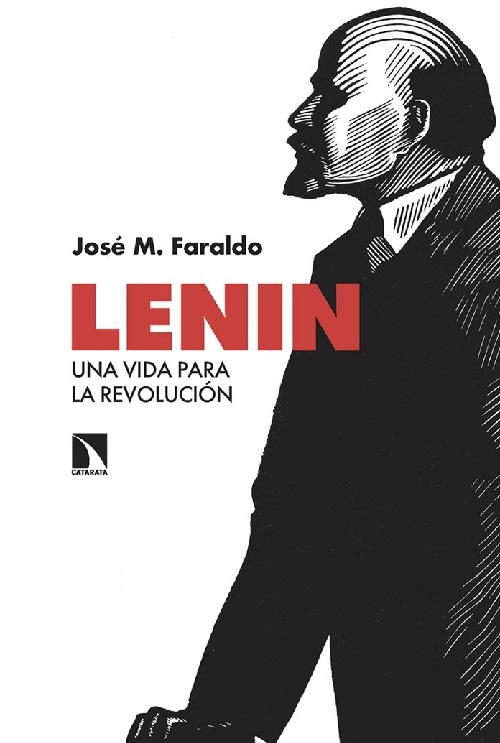- Books
- 13 de May de 2024
- No Comment
- 7 minutes read
«Lenin». Una vida para la revolución (A life devoted to revolution)

«Lenin». Una vida para la revolución «Lenin». (A life devoted to revolution)


Lenin, a man’s life
Those of us who remember well a fundamental book by José María Faraldo, Las redes del terror (Galaxia Gutenberg, 2018), a work focused on the terrifying political police of communist regimes, are pleased to see the steady, unhurried publication of each new book by this true specialist in Eastern Europe.
On this occasion, Faraldo presents a biography of Vladimir Ilyich Ulyanov, crafted with two fundamental principles in mind: portability (or manageability), and a notable impartiality. In the important prologue to Lenin: Una vida para la revolución (Catarata), the author elucidates two key points: firstly, that on the centenary of Lenin’s death there was a pressing need for a work on his persona that fled both from monumentality and from presentist ideological implications, and that this work had to be informative. In this prologue, the author reveals academic convictions that resonate deeply with the author of these lines, who also penned a biography of the only Spanish communist leader who was a pure Bolshevik, that is, a full-fledged member of the CPSU, Andreu Nin: “I have tried to understand Lenin in his own terms, removing him from the straw of myth, to situate him within his own time and place.”
The ability to write history without the intrusion of vested interests is of paramount importance. Thus, what this book brings us, is a trajectory devoid of ideological stridencies, which seeks the utmost objectivity. A little earlier, Faraldo wrote: “Academically it is difficult to surpass the works of Robert Service and Dimitri Volkogonov, who already had access to the documentation from the Russian archives, which had been off-limits for decades”. Therefore, it was not so much to compile another monumental account of the life of the Soviet leader, but rather to organize a vast body of material and disseminate its more mundane and prosaic reality: “I have sought to distance myself,” the author continues, “from the most ideologized interpretations of the Cold War and, above all, from the period following the collapse of the system that Lenin helped to build. The banal anti-communism of the ‘black books of communism’ and, in our country, of the Jiménez Losantos and similar, has inflicted considerable damage on scientific historiography: beyond their legitimate moral and political stance, scrutinizing history as if it were a judgment of posterity contributes nothing to the understanding of the facts, but rather obscures them, constructing a myth, albeit a negative one.”
I join this claim for methodical historiography and for the average reader. Although, in essence: “One cannot remain neutral towards someone who played a decisive role in erecting a dreadful dictatorship and in sketching the initial designs of totalitarianism as a system. But one can harbour a firm humanist conviction against violence and authoritarianism (Bolshevik in this case) and, nonetheless, calmly delve into the past to comprehend the historical phenomenon and its significance.” A keen observation, indeed, for academic objectivity is not incompatible with ethics. Therefore, Faraldo not only condemns the hagiographies and anathemizations of historical figures, but also advocates for the creation of a legitimate history, a space of honesty and tranquillity that is increasingly elusive in a world dominated by noise and ideological deafness.
Rosa Luxemburg had already engaged in a polemic with Lenin about the sectarian and military design of the Bolshevik party, whose ultra-centralist peculiarities would permeate not only the Soviet system but also, from 1919, the Marxist political options adhered to the Comintern. Faraldo, a professor at the Universidad Complutense de Madrid, has more than fulfilled his objectives: his work is as comprehensive as it is succinct, providing all we need to know about one of the most pivotal figures in contemporary history. Yet, it does so without melodrama, also attending to the private sphere of a man whose legacy has been manipulated (and even censored) to the point of exaggeration, either to sanctify or demonize him. What should interest us most is the reality of this stubborn and cultured Russian journalist who founded an unyielding dictatorship and turned the world upside down from 1917 onwards.
Within these pages, we can acquaint ourselves with Lenin, traumatized by the execution of his brother, implicated in an assassination attempt against the Tsar, or seen hunting and climbing mountains, or studying Law and Marxist texts with remarkable discipline. We see him accompanied by figures also essential to understand his evolution (Krupskáya, Trotsky, Martov, Plekhanov), we see him moved by a rather populist novel by Chernyshevsky, and ultimately, cohabiting with family and friends in all kinds of private and political activities. Faraldo conceives Lenin as a journalist and activist with little intellectual weight but with an excessive ambition and a desire for command beyond all measure. Lenin was not a psychopath or a visionary genius, but a skilled and cynical politician, authoritarian and specialist in all kinds of tricks and manipulations, austere and daring, obsessed from his earliest youth by the workers’ revolution. This Lenin, reconstructed from the most complete erudition, is the one that helps us understand an entire era.
Title: Lenin: Una vida para la revolución
Author: José M. Faraldo
ISBN: 978-84-1352-945-5
Publisher: Los libros de la Catarata
Language: Spanish
Number of pages: 157 pages
Publication date: March 2024
Source: educational EVIDENCE
Rights: Creative Commons


